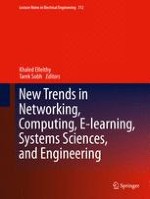2015 | OriginalPaper | Buchkapitel
Integral KNIT Cluster as a Source of Development Factors and Technological Frame for the Realization of Country Development Projects
verfasst von : Aleksandras Vytautas Rutkauskas, Viktorija Stasytytė
Erschienen in: New Trends in Networking, Computing, E-learning, Systems Sciences, and Engineering
Aktivieren Sie unsere intelligente Suche, um passende Fachinhalte oder Patente zu finden.
Wählen Sie Textabschnitte aus um mit Künstlicher Intelligenz passenden Patente zu finden. powered by
Markieren Sie Textabschnitte, um KI-gestützt weitere passende Inhalte zu finden. powered by
